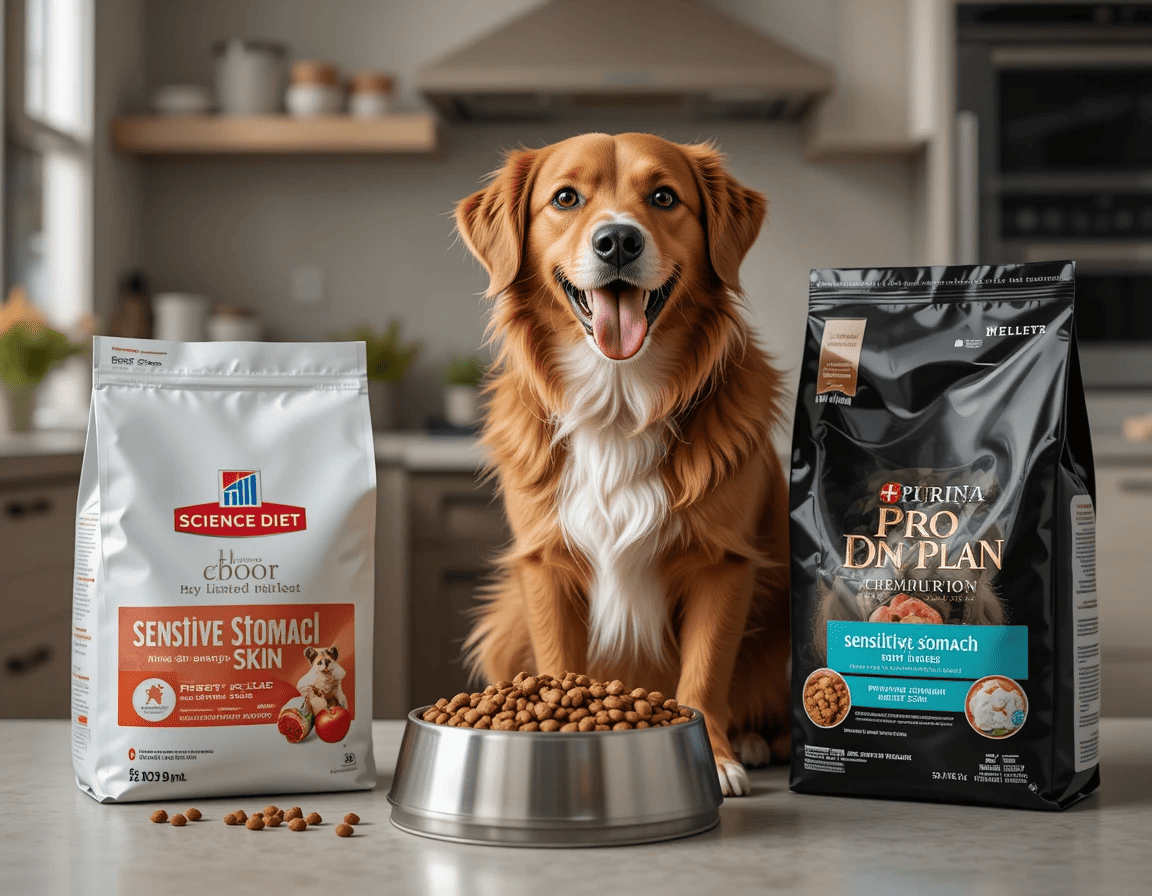
Best Dog Foods for Sensitive Stomachs in 2025
When your dog suffers from a sensitive stomach, mealtime can become stressful—for both you and your pup. Digestive issues like vomiting, gas, bloating, or loose stools are common signs that your dog’s current diet isn’t working. The good news? With the right dog food, many of these symptoms can be reduced or eliminated entirely. In this article, we’ll explore the best dog foods for sensitive stomachs in 2025, based on expert vet advice, real pet owner reviews, and ingredient quality.
Understanding Sensitive Stomachs in Dogs
Before diving into the best foods, it’s important to understand what might be causing your dog’s stomach issues in the first place. Common causes include low-quality ingredients or artificial additives, food allergies or intolerances (e.g., to chicken, beef, wheat, soy, or dairy), sudden changes in diet, infections or parasites, pancreatitis or other digestive disorders, and stress or anxiety. Once your vet has ruled out any serious health conditions, switching to a sensitive-stomach-friendly food is
Key Features of Dog Food for Sensitive Stomachs
When shopping for the best dog food for sensitive stomachs, keep these key features in mind. Limited ingredient formulas with fewer components mean fewer potential allergens. Easily digestible proteins such as salmon, lamb, or turkey are preferable. Avoid artificial colors, flavors, or preservatives. Look for prebiotics and probiotics to support gut health. High-quality fiber sources like sweet potatoes or pumpkin can aid in digestion. Depending on your dog’s needs, consider grain-free or grain-inclusive options.
Top Recommended Dog Foods for Sensitive Stomachs
Hill’s Science Diet Adult Sensitive Stomach & Skin is a vet-recommended formula that supports both digestive and skin health. It uses prebiotic fiber to fuel gut bacteria and includes vitamin E and omega-6 fatty acids to nourish your dog’s skin and help maintain a healthy, shiny coat. Learn more hre.
Purina Pro Plan Sensitive Skin & Stomach (Salmon & Rice) is an affordable and widely available option. It includes probiotics for digestive health and omega-3s for inflammation control. The high-quality salmon paired with rice and oatmeal makes it easy on digestion while still being very tasty. Find out more here.
Blue Buffalo Basics Limited Ingredient Diet is designed for dogs with food sensitivities. It skips common allergens and uses a simple formula to reduce the risk of reactions. Explore options here.
Canidae PURE Limited Ingredient Premium Dry Dog Food is free of fillers, and the limited ingredient list is perfect for dogs with complex dietary needs..
Royal Canin Veterinary Diet Gastrointestinal Low Fat is a prescription formula trusted by vets for dogs with more serious gastrointestinal problems, including fat intolerance. More information here.
Wellness Simple Limited Ingredient Diet offers a simple, natural formula that promotes digestion, making it great for small dogs with tummy troubles..
Transition
ing to a New Dog Food Safely
Switching your dog’s food should be done gradually over 7–10 days to avoid worsening digestive issues. Start by mixing a small amount of the new food with the current food, gradually increasing the proportion of the new food while decreasing the old food. If you notice vomiting, diarrhea, or lack of appetite during the transition, slow down the process or consult your vet.
Natural Add-Ons to Support Digestive Health
In addition to high-quality food, you can add a few natural options to your dog’s diet. Pumpkin puree (unsweetened) is a great source of fiber. Plain boiled chicken and white rice can help with upset stomach recovery. Probiotic supplements promote good gut bacteria, and bone broth is soothing and nutritious for digestion.
When to Consult a Veterinarian
If symptoms persist beyond two weeks after switching food, or if your dog shows signs like vomiting blood, weight loss, lethargy, or constant diarrhea, see your vet immediately. Chronic digestive problems can be a sign of something more serious like inflammatory bowel disease (IBD) or intestinal parasites.
Final Thoughts
Every dog is different, and finding the best dog food for sensitive stomachs might take a little trial and error. However, with the right formula—one that prioritizes real ingredients, limited allergens, and added digestive support—you can make a big difference in your dog’s comfort and overall health. Remember, a happy tummy equals a happy dog!




Add comment